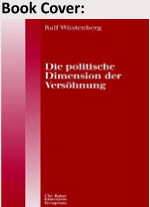Serviços Personalizados
Artigo
Indicadores
Links relacionados
-
 Citado por Google
Citado por Google -
 Similares em Google
Similares em Google
Compartilhar
HTS Theological Studies
versão On-line ISSN 2072-8050
versão impressa ISSN 0259-9422
Herv. teol. stud. vol.67 no.3 Pretoria Jan. 2011
BOOK REVIEW
Experiencing Wüstenberg's Habilitationsgeschrift (2003)
Book Title: Die politische Dimension der Versöhnung

Author: Ralf K. Wüstenberg
ISBN: 3-579-05418
Publisher: Chr. Kaiser (Öffentliche Theologie 18), Gütersloh, 2004, p. 720, cost unknown
Reviewer: Danie P. Veldsman (Department of Dogmatics and Christian Ethics, University of Pretoria, South Africa) Email: danie.veldsman@up.ac.za
The research focus of Wustenberg's Habilitationsgeschrift (2003), published by the Theologische Fakultät der Universität Heidelberg, Germany is on the experience of guilt and reconciliation in a post-conflict (or war) context, and then specifically theological reflection on the preconditions for reconciliation in a 21st century political context. The question for him is: can theology help in such a concrete political situation, and if so, how can it help? He refers to the theme as: 'Der Suche nach einer friedlichen Nachkriegsordnung' ['In search of a peaceful order after war'].
His (re)search is structured in three sections. Firstly, a theoretical framework (Teil I: Theoretische Grundlegung) in which he formulates the preconditions for his methodological (inductive) reading of the (political) 'signs of the time' and its significance. Secondly, an empirical study (of more than 300 pages!) of two case studies (Teil II: Die 'Zeichen der Zeit' wahrnehmen [Empirische Analyse]). He uses South Africa, specifically the work of the Truth and Reconciliation Commission (TRC) and Germany, specifically the Enquête Commission (EK) as respective case studies. Both countries find themselves in post-conflict phases in their respective histories: South Africa 'after' Apartheid, (East) Germany 'after' a Socialist Regime. Thirdly, a systematic-theological synthesis of his research results (Teil III: Die 'Zeichen der Zeit' deuten [Theologische Synthese]) follows. His synthesis (of more than 200 pages!) consists of two movements. The first movement is a systematic (deductive) reconstruction of the theological task that he has set himself. The reconstruction is undertaken in four deductive steps, namely (1) as an orientation from church history, (2) a discussion of different theological models (Origines, Anselm, Abaelard and Aulen, Wheeler etc.), for reconciliation and the (3 & 4) analytical concepts he employs as tools for the (symbolic and metaphoric) reading and understanding of reconciliation from a political and theological perspective. The second (and concluding) movement consists of five (brief) ecclesiological theses.
Wustenberg's completed project is impressive. Not only valuable with regard to the wealth of material from both contexts that he has incorporated into his work, but also with regard to the clear, well-structured and coherent manner in which it is assimilated into his theological synthesis of the preconditions for reconciliation in a post-conflict political situation. Even though he does not come to 'last and final answers' ('letzgültige Antworten') which he explicitly denounces in the 'Vorwort' as an aim of his study - he reaches insightful and theological useful guidelines ('Normative Leitgedanken') for any further reflection on and (spiritual) realisation of reconciliation in a political context (see p. 559f for his overview on the five options, namely 'Strafe, Amnestie, Wahrheit, Wiedergutmachen und Neuanfang', p. 571 for his overview of three designs for spiritual roads - 'Versöhnungswegen' - of reconciliation, and pp. 578-580 for his overview of the political reconciliation process). This impressive text is augmented with a list of Abbreviations (pp. 672-673), a Bibliography comprising primary and secondary literature (pp. 674-717), a list of the interviews (pp. 717-718) and the questionnaire for the interviews in South Africa (pp. 719-720). It is, however, a pity that, given the extent of the text (of more than 700 pages!) it does not offer author and subject indexes too.














